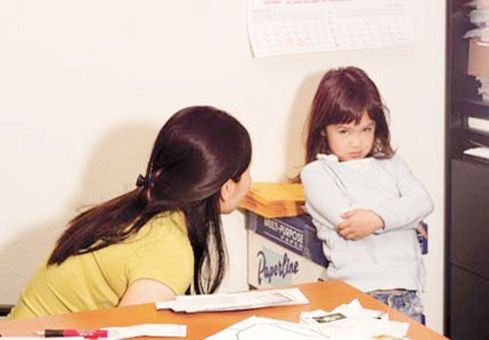
Do not beat a bad kid to teach him 2
The young father currently lives in District 10, Ho Chi Minh City, and said his son Huy is 7 years old.
Last weekend, when he came home from work, Trung discovered little Huy was taking money from his father’s shirt pocket hanging on the wall.
Children’s stubborn attitude causes many parents headaches.
Sharing the same sentiment, Ms. Lan (District 12) said that her son is 14 years old this year.
During a conversation with a psychologist, Ms. Hoa (Go Vap district) asked: `My child is 16 years old, wears strange clothes, likes to play games, is ready to skip school to go out with friends.
According to Master of Psychology Nguyen Thi Minh, lecturer at the National Academy of Public Administration, Ho Chi Minh City, the above situation is a problem faced by many families today, when parents feel `powerless` with their own children.
Ms. Minh believes that in educating children, beating and scolding not only does not help but also has the opposite effect, making the child more stubborn, stubborn and making more serious mistakes.
Through this, Ms. Minh suggests to parents how to educate their children using the `no spanking` method based on research by Plan (a non-governmental humanitarian organization, focusing on helping children).
1. The child’s purpose is to attract attention:
For this purpose, the child will often act like a clown, be mischievous, dress in unusual ways, be forgetful, and neglect things to do.
– If possible, minimize or ignore the child’s behavior at that time.
– Looked serious but didn’t say anything.
– Direct children to other more appropriate behaviors.
– Remind (name, job to do), give children a choice, for example: You can cook rice now or later, but when mom comes home at 11 o’clock, you have to finish cooking.
– Analyze behavior and consequences.
– Set up rules or next steps that parents will take with their children.
2. The child’s purpose is to demonstrate power and strength:
The child will exhibit aggressive behavior, fighting, arguing, arguing, hostility, defiance, disobedience, lying, `letting go`, stubbornness, opposition, resistance.
– Calm down, withdraw from the argument, avoid conflicts, do not participate in fights, so that the child can calm down his temper.
– Try to understand the child’s emotions, show that you understand those emotions, share your feelings about the situation, and discuss to prevent similar problems in the future.
– Help children see that they can use `strength and power` in a more positive way.
– Decide what you will do, not what you will tell your child to do.
– Establish rules or next steps in which parents will need to spend time with their children.
3. Purpose of retaliation:
Children will express themselves by hurting someone, being rude, violent, destroying things, stealing, looking at others with a cruel attitude, and speaking insultingly to others.
– Patient.
– Maintain friendliness while patiently waiting for your child to calm down.
– Encourage cooperation and build trust.
– Work collaboratively with children individually to solve difficulties.
– Use encouragement skills to show children that they are loved and respected.
– Establish rules or next steps in which parents will need to spend time with their children.
4. Purpose of displaying inappropriate behavior or avoiding failure:
Children show signs of giving up easily, not trying, not participating, skipping work, skipping school, and sometimes finding a way out through drugs.
– Do not criticize or disparage.
– Spend time training or tutoring children (especially in learning).
– Divide tasks into small parts, starting with easy ones so that children have initial success.
– Use encouragement skills, focusing on children’s strengths.
– Do not show pity, do not surrender.
– Spend regular time with children and help them.
5. The goal is to find excitement:
Children show signs of: avoiding monotonous daily work, easily interested in unusual hobbies (mischievous games, adventure, alcohol, drugs, sex) and often hanging out with friends who are `in the same boat`.
– Try to diversify or balance the activities children have to do (studying, housework) and healthy entertainment activities according to their interests.
– Work together to find ways to make life more fun and enjoyable.
– When children engage in irresponsible or risky behaviors, parents can help them realize the consequences of those behaviors and encourage them to find more positive behaviors instead.
6. Purpose of seeking acceptance from friends:
Children will show signs of: constantly trying and showing off to be accepted by many peers, willing to skip school to hang out with friends, stealing money to make friends.
– Analyze for children to understand the values of friends, what should and should not be done when playing with friends.
– Teach children procrastination skills to have more time to handle situations when friends invite or challenge them.
Minh Minh – Thi Tran



